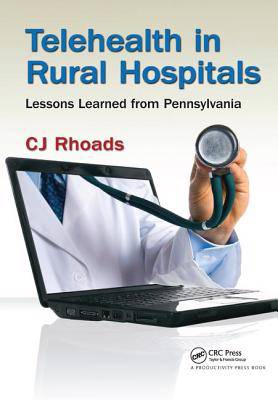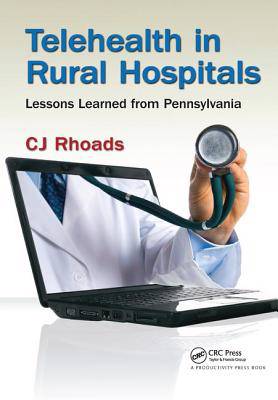
- Retrait gratuit dans votre magasin Club
- 7.000.000 titres dans notre catalogue
- Payer en toute sécurité
- Toujours un magasin près de chez vous
- Retrait gratuit dans votre magasin Club
- 7.000.0000 titres dans notre catalogue
- Payer en toute sécurité
- Toujours un magasin près de chez vous
243,45 €
+ 486 points
Format
Description
Improving the quality of healthcare, while increasing accessibility and lowering costs, is a complex dilemma facing rural communities around the world. The Center for Rural Pennsylvania believed that telehealth, the use of electronic information and telecommunications technologies to support long-distance clinical healthcare was a viable solution so it recently provided grants to conduct a thorough investigation into the factors involved.Telehealth in Rural Hospitals: Lessons Learned from Pennsylvania reports the outcome of this year-long investigation. Illustrating telehealth implementations in rural settings, it supplies an overview of telehealth as well as an assessment of its economic impact.The book skillfully intertwines the research and academic aspects of telehealth with helpful insights from the author. One of the most important discoveries made by the author and her team of researchers is that all too often money is wasted by implementing telehealth for services that don't impact many people. This book shares valuable insights on using telehealth for integrative health practices that could improve the health of a greater portion of the population.This book illustrates how telehealth can, indeed, be the healthcare savior that some people believe it will be, but only under the right circumstances. It details exactly what those circumstances are so that everyone, including clinicians, patients, government entities, and vendors, can steer toward the best future path.The author identifies the obstacles preventing wider implementation of telehealth and explains how recent federal legislation will affect telehealth implementation in rural communities. She also points out the folly of developing electronic health records before federal data standards are put into place.The book concludes by detailing best practices and lessons learned for implementing a telehealth program in any state. It also outl
Spécifications
Parties prenantes
- Auteur(s) :
- Editeur:
Contenu
- Nombre de pages :
- 336
- Langue:
- Anglais
Caractéristiques
- EAN:
- 9781138431621
- Date de parution :
- 27-07-17
- Format:
- Livre relié
- Format numérique:
- Genaaid
- Dimensions :
- 178 mm x 254 mm
- Poids :
- 452 g

Les avis
Nous publions uniquement les avis qui respectent les conditions requises. Consultez nos conditions pour les avis.






